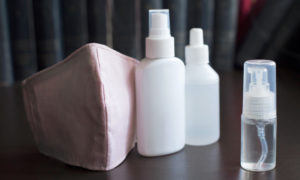 The loss of conferences and expos due to COVID-19 prevention measures has not affected the sale of white label goods as much as may have been anticipated, according to companies. In fact the whole CBD sector appears to have been fairly resilient to the overall downturn brought about by the pandemic.
The loss of conferences and expos due to COVID-19 prevention measures has not affected the sale of white label goods as much as may have been anticipated, according to companies. In fact the whole CBD sector appears to have been fairly resilient to the overall downturn brought about by the pandemic.
Even in the worst cases, COVID issues have only led to delays rather than outright cancellations of new product launches, according to Frederik Hendriksen, vice president of international sales and business development at Mile High Labs.
There has been some business lost in terms of new purchases – though Hendriksen said these were delayed rather than completely lost. Repeat purchases have continued fairly normally.
There has been more interest from companies looking for cannabinoid ingredients than those looking to launch private labels, but the business has been surprisingly resilient overall from the COVID impact, he said.
The loss of conferences has not been particularly material as the benefit of many was not well mapped out. “The biggest value is the networking,” he added. “And the results have been pretty good from the existing customer base.”
Companies become ‘more creative’
Others are unsure whether delays in white label goods will remain delays or turn into cancellations. The white label market for the UK is saturated, according to Carlo Buckley, managing director – Europe for CBDFx. As a result, it’s difficult for many to make money given typical overheads for picking and packing at such small volumes. “There’s been an explosion of small brands without scale that are going to white label suppliers,” Buckley told CBD-Intel. “[These brands] cannot benefit from some form of economics of scale or benefit from long-term supply partnerships too.”
This means that some may not be able to survive a downturn in business and delayed orders could turn to cancellations.
This delay in launching new brands that would require white label production can be seen in the US as well. Grocery and larger marketplaces are putting launches on hold, according to Larry Berg, co-founder and CEO of the CBD Marketing Hub.
But – as Mile High also saw – some are continuing to forge ahead and seeing it as a time to go to market with a new test product to examine issues such as quality. “Companies are still progressing forward with plans despite the market,” said Berg. “They’re reading the market and saying ‘We’re going to come out at some point and we need to be one of the players that survive this.’ Transitions will happen and some smaller companies won’t make it through because of market or financial position.”
This means that some established brands are using the time to try to get in front of new retail outlets. This has resulted in more engagement with video, such as using video calling services, as well as further engagement with emails and remote shifting. “There’s been a shift from face to face to retailers getting more creative,” Berg added. “There are more email introductions and direct mail introductions leading to remote sampling and then talking through the opportunities with a video call.”
Making the most of the circumstances
Companies have had to rethink how they do business with other firms during this time and some of those lessons and actions may continue into the post-pandemic period when face-to-face meetings can become a common option once again, he said.
A few companies have been able to utilise opportunities as best they can given the circumstances. Some are using the time to rethink their branding. Many have turned to the production of hand sanitisers as they had the ingredients necessary to hand.
Some have attempted to directly capitalise through sales by attempting to create a unique selling point – the addition of cannabinoids to increase potency. CBD-Intel has seen no scientific evidence that cannabinoids have any effect on viruses and only preliminary studies on their impact on bacteria.
Others have either donated sanitiser to front-line workplaces or other areas of need – some with labels for a bit of extra marketing. While some have used the sanitiser to help drive business – for example, by selling it at cost or cheaper and including a free sample of a CBD product with it.
“Receiving a free gift at home is a great opportunity to bring someone into your tribe,” Berg told CBD-Intel.
What This Means: Despite the assumption that the COVID-19 pandemic would result in disastrous consequences for the CBD industry, companies have reported that the sale of white label goods has actually been affected far less than anticipated. In spite of the cancellation of expos and conferences, most companies appear to have suffered only delays to product launches, and while it is still uncertain as to whether these will turn into cancellations, the overall view is that most companies are continuing on with their plans.
Of course, there will be casualties – especially smaller businesses – however, many companies appear to be doing whatever they can to survive the current climate, using the time to assess their strategies and developing new product innovations that meet the current market needs.
– Freddie Dawson CBD-Intel staff
Photo: Tetiana Shyshkina







